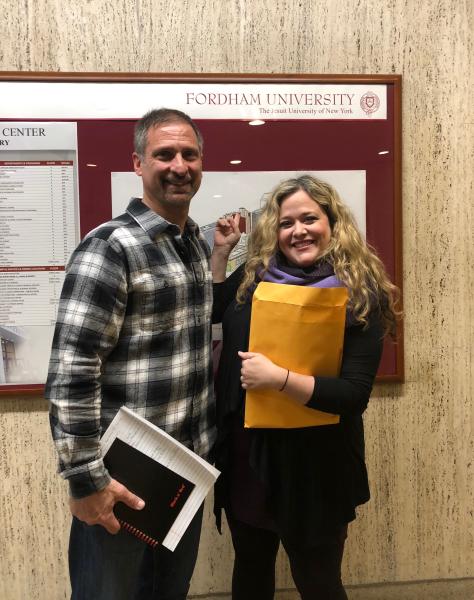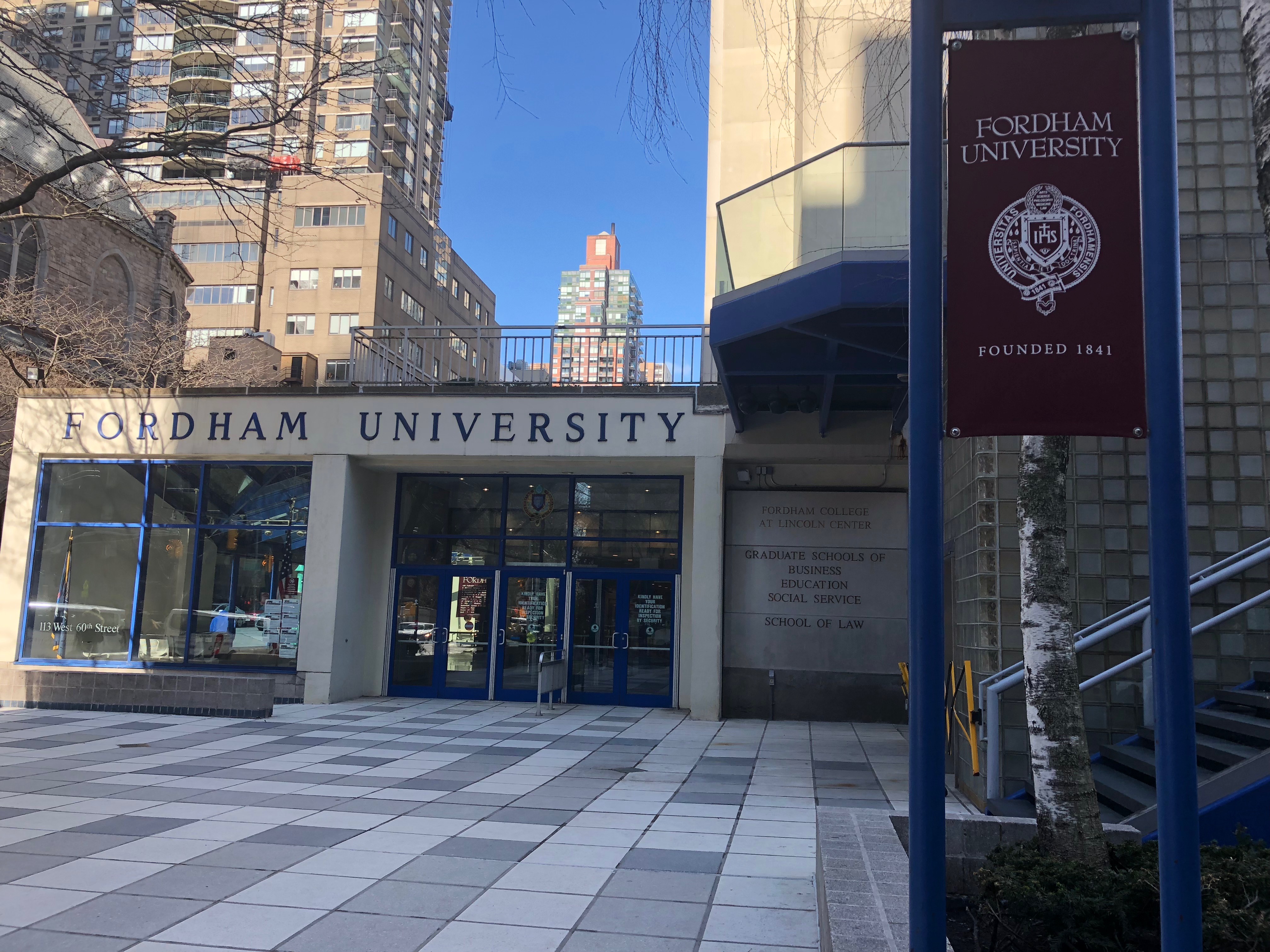
There are so many ways to impact society in a positive way. Whether it is in healthcare or in another industry entirely, you can change the world, help people and continuously enhance and alter your own career path. The time of terminal degrees or careers is over, so don’t let anyone put you in a box - especially you.
Practicing medicine after obtaining a medical degree is just one avenue to influence healthcare. Even that road can take many twists and turns given the fluid nature of a changing workplace and dynamic system.
Such was the topic of a recent guest lecture I was honored to give to a wonderful group of bright, engaged, & respectful undergraduates who aspire to be health professionals. You will note the picture accompanying this piece where I am featured with Martin Di Grandi, PhD, Associate Professor of Chemistry -Department of Natural Sciences, Fordham College at Lincoln Center. He was so gracious to invite me and create a worthwhile learning experience for his students.


In adolescence and during college especially, it feels often like you must know exactly what you want to do with the rest of your life. You will encounter others, sometimes friends and loved ones who love you the most, who encourage such a narrative. Their worry or concern comes from the best place. Sometimes it comes from strangers. But, often the pressure can also be self-induced.
Not sure this changes so much as we enter adulthood.
Know this, you can always change course no matter your age. This can make the journey challenging at times, but so can the alternative while filling you with regret. Shift your attitude to realize that knowledge - good, bad or indifferent, is cumulative and builds on itself so it is never a waste. If you embark on one degree or career path and decide to stop pursuing it, then it is not a failure but an opportunity to get you closer to where you were meant to go. And, you will have learned lessons or skills that you will likely apply in varying contexts down the line and established rewarding and meaningful relationships.
So, what if you don’t know where to start…
Ask yourself the following when exploring alternative careers to medical practice:
-
At the most basic level, what do you love? What subject matter excites you?
-
Do you want to be directly involved in patient care? Or not?
-
Would this career or path build on your strengths and energize you or does it seem like it would deplete you?
-
Have you considered what kind of lifestyle you envision in your future?
-
Does this track have a future in healthcare’s changing landscape? Will your skills be transferable and provide continued opportunities for growth?
-
Is there someone you look up to in a job you find of interest?
Perform the exercise of answering these questions.
An example
Let’s say your answer to the first question is cancer.
Yes, you want to be involved in patient care
There are limitless avenues for you to pursue that involve no further education to more advanced degrees. Of the latter, formal certification can involve months to years. Being a medical assistant in an oncologist’s office or a nurse practitioner or physician assistant for a surgical oncologist, for example, require varying levels of training and maintenance of certification. As does becoming occupational, speech or physical therapists or nutritionists for those patients recovering from extensive resections etc. Nursing is an incredible background with unlimited potential paths. Pharmacists develop relationships in communities and, these days, are becoming more and more integrated into the care team. In certain hospitals, they routinely round with medical teams on inpatient wards. Social workers can be instrumental to a patient’s well-being.
Do you want to be in a hospital, hospice, rehab or long-term skilled nursing setting? Outpatient facility? With kids or adults? Assisting veterans? Do you want to be a phlebotomist or someone who performs procedures? Do you want to avoid procedures? Do you like to teach others? Do you want to work in an operating room and be a nurse anesthetist or a scrub nurse? Or in intensive care? This is where going down the question list will help you refine the right fit for you. Then, you can research what necessary hurdles there are to get there.
Are you creative? There are many opportunities within computer animation, simulation, 3D printing and anatomy - especially in the world of medical education - where you can be a medical artist or illustrator (see my article From Anatomy to 3D Printing: Art Inspires Life). Do you want to help design prosthetics or be a biomedical engineer who solves the problems that diagnosis and treatment can create? These individuals have to work with patients depending on their specialty. Are you great at languages to be a medical translator? (See my article 5 Fun Ways To Impact Medicine (Without Medical School)).
For instance, Child Life health professionals are an incredible part of the pediatric care giving team. They work with physicians, nurses and providers along with the patient and his/her family to augment the child and loved ones’ experience as well as help and support their ability to cope with the struggles of illness, disability, painful procedures and other challenges of being hospitalized. They have their own certification process.
No, you don’t want to be involved in patient care
There are innumerable possibilities within the nonprofit advocacy sphere like working for the American Cancer Society (or the many other oncology directed organizations) in a capacity that suits your skills. Maybe you want to lobby in Washington, DC on behalf of cancer patients or research. You can be a professional medical writer who helps institutions write grants, works for a cancer specific journal or more mainstream magazine or website. Professionals in medical and science communications navigate multimedia platforms across a spectrum of sectors. Certified cancer centers often do a lot of scientific research, maybe your skill is in raising money for them to continue to do this vital work. Those roles fall under institutional advancement or development.
Maybe the corporate road is your perfect route. Working in cancer drug divisions for pharmaceutical companies could involve research and development to sales and marketing positions. Or, do you have an entrepreneurial bent since startups in the digital health space are currently a hot trend. Bioinformatics, telehealth, data analysis and correcting the lack of present day interoperability in electronic medical records is another approach that could be tailor made in the oncology space - the public and private sectors allow for many thoroughfares. Medical billing and coding as well as the health insurance industry are additional paths too. Designing programs that get employees healthier are often encouraged in this realm, particularly in corporate wellness programs. Hospital administration or managing community health centers is also a fulfilling line of work.
Doctorate degrees aren’t always necessary. Exploring master’s degrees in business, public health or policy might propel you in the best direction. Sometimes these schools prefer real-world experience first, so do your homework to determine your ideal guideposts. Maybe you want to be a student forever and being a research analyst suits you. Maybe a nursing or pharmacy background could best serve you to enter patent law to protect your inventions or assist others with their discoveries.
Then, as you start to eliminate from your list take an honest personal inventory about how you see your life
Would you prefer shift work? In these cases, you know the hours you are working and are free the rest of the time. Sometimes these hours can be overnight shifts within certain disciplines. Are you okay with being on-call for the rest of your life? Many fields, especially ones requiring more advanced degrees, insist on annual continued education and certification. Are you okay with this to maintain your license? Does potentially taking years to pay off school debt bother you? The answer might be different for each of us.
Maybe you want a traditional road that provides more job security and you can thrive in bureaucracy. Maybe you like adrenaline and are a free spirit so being in combat, travel or mountain medicine holds an appeal. Emergency medical services get dispatched in all types of environments from the suburbs to ski slopes to specific occupations to disaster relief. Maybe you enjoy sports and become a trainer for a team. Or, is forensics a passion? Maybe you love animals and helping people? There are foundations that train animal-assist therapy teams that go into nursing homes and hospitals or service dogs that need intensive training to support an individual with a disability.
The options are vast with so many exciting ways to get there.
It’s totally fine not to be sure. You will shift your priorities and simplify what you really need and want with the passage of time and through experience. Never forget, you cannot know until you try so don’t paralyze yourself with indecision - it is as much an action as a decisive one. You can always course correct. Weigh the risks and benefits, give yourself a deadline to get started and just keep it moving. Momentum keeps you growing and learning.
Go through all of the questions I outlined in the bulleted section at the beginning of this piece and apply them to your topic of interest. You can approach it the same way if opting for pursuits in dentistry to veterinary medicine etc.
Do you know anyone in your dream job?
Or, maybe you know someone who may know someone in it. Ask! Tell the world and talk to anyone who is remotely connected to this path. If you gain one pearl of wisdom from each exchange, then you are moving in the optimal direction to figuring out your next steps. It is a process, and no one can tell you what you want to do but they can make suggestions that illuminate your discovery.
You may see someone in the news or learn about the head of a company who have interesting careers. Send them an email. You will find that it is often the people at the top who are the real deal and driven to mentor future generations. Don’t take it personally if you don’t hear back, they are very busy and who knows if you even found the correct address. You just never know and sometimes you will be pleasantly surprised. (see here for the importance of mentors in positive youth development). This holds true for anyone you respect and admire - a multigenerational outreach is quite productive as everyone has a unique perspective to offer.
Whether it is medicine, dentistry or veterinary careers, there are a number of paths you can take to follow your dreams. Shoot me an email (jamie@acsh.org) if you think I can be of help - if it isn’t in my wheelhouse, then maybe I will know someone whose wheelhouse it is! Follow me on Twitter @jamiewellsmd where I often share material relevant to the topic.



